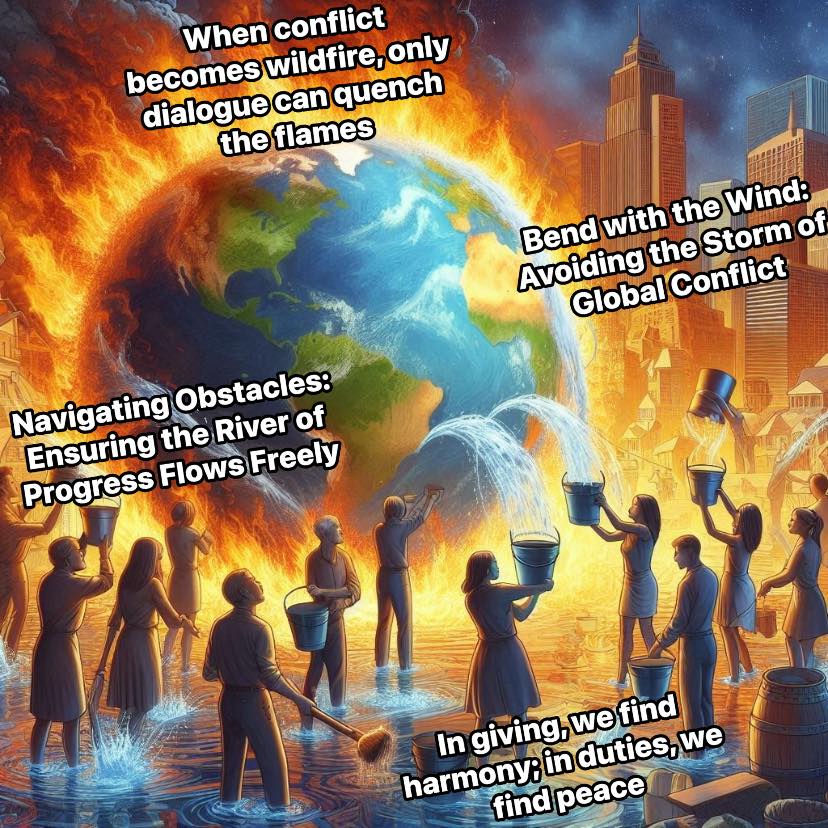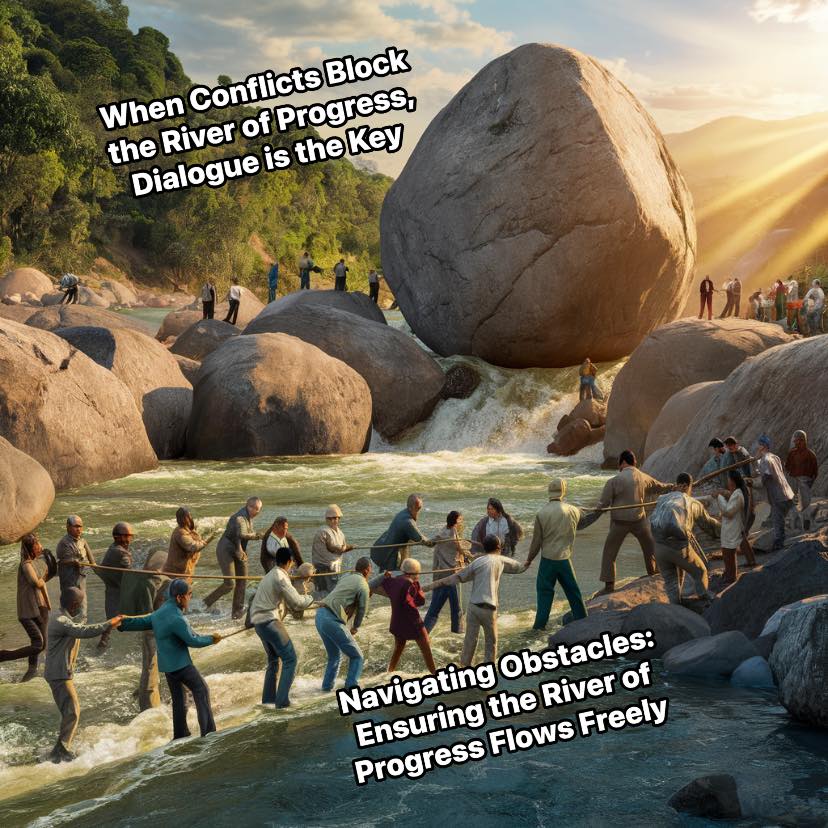
Even the smallest disagreements—whether among family members, friends, or nations—can swiftly escalate from mild disputes to fierce confrontations, drawing people into harmful and destructive actions. If these conflicts are not addressed, they can erect walls of violence and warfare that bring human progress to a standstill.
Human life resembles a river, constantly flowing and naturally inclined to move forward. Yet, when conflicts arise, they act like boulders blocking the river’s course, causing stagnation. The only way to clear these obstructions is through dialogue and understanding, not by attempting to remove those involved in the disagreement. Instead of trying to forcefully change the course of the river by eliminating those who oppose us, we must embrace the current situation and work together to navigate the obstacles, allowing the river of human progress to flow freely once more.
Just as a tree must bend with the wind to avoid breaking, so too must we approach conflicts with flexibility and a willingness to listen. By addressing the root causes of disagreement through peaceful means, we can prevent the storm of violence and war from uprooting the tree of human civilization.
In today’s world, the wars that rage across various regions are like wildfires, spreading rapidly and indiscriminately. If these flames of conflict are not extinguished soon, it’s only a matter of time before every city becomes a battlefield, engulfed in chaos and destruction. The once-thriving gardens of human civilization risk turning into desolate wastelands, where the seeds of progress can no longer take root. We stand at a crucial crossroads: we can either douse these fires with the water of dialogue and understanding or watch helplessly as the inferno spreads, turning our global village into a war zone where no one is safe.
To prevent this, it’s time to transform our global village into a unified international government, where nations function as states within a single, cohesive system. In such a world, the need for occupation, foreign policies, territorial disputes, geo-political rivaliries, and proxy wars would become obsolete, as all regions would operate under a shared framework of laws, cooperation, and mutual understanding. This international government would act as a guardian of peace, ensuring that disputes are resolved through dialogue rather than conflict. Just as individual states within a country work together for the common good, so too would nations collaborate within this global structure, eliminating the divisions that often lead to violence.
In the 21st century, we can no longer afford to operate with the outdated mindset & outdated global order of the 20th century. The challenges we face today require innovative thinking and a commitment to progress, not a return to the strategies of the past. We cannot undo history, nor should we attempt to; instead, we must learn from it and move forward with a vision that prioritizes global unity and cooperation. The conflicts and divisions that once defined international relations must be replaced with a new approach, where nations act as states within a unified international government. This forward-thinking model would render foreign policies, rivalries, and proxy wars unnecessary, fostering a world where peace is maintained through collective governance and shared responsibility.
We need to also shift our focus from being fixated on personal rights to becoming duty-conscious individuals. The relentless pursuit of individual rights—whether for personal gain or even in the name of self-defense—often leads to social disorder, fostering rivalries and power struggles that deepen societal and nations divisions. A mindset centered solely on rights is like a blindfold, obscuring the harm it can inflict as it fractures unity and breeds discord. In contrast, a duty-centered approach fosters harmony, solidarity, peace, and compassion. When we prioritize fulfilling our duties—giving others what they need from us—we create a foundation for a society rooted in mutual respect and understanding.
This world is fundamentally driven by challenge and competition; nothing comes to us without effort. Pursuing power through weapons, bombs, or missiles is futile in the face of life’s true challenges. Life follows the principle of give and take—like a garden that requires care and nourishment before it can bear fruit. We must first plant seeds of goodwill and generosity in others before we can expect to reap any benefits in return. This is an unchanging law of nature, ordained by the Almighty. Let us ask for our rights not from one another, but from the Almighty, and commit ourselves to the duties that will create a more just and peaceful world. As the saying goes, “It is in giving that we receive.” By adopting this mindset, we can cultivate a world that is just, peaceful, and thriving—a garden where the seeds of our efforts blossom into a rich harvest of harmony and compassion.
By embracing this vision and this mindset, we can create a world where the flames of war are extinguished, and the seeds of progress can flourish once again in every corner of the earth.


